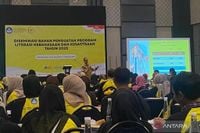On a bright Sunday morning in Garut, West Java, the Pamengkang Room buzzed with anticipation. It was August 31, 2025, and the local government was about to take a decisive step in the ongoing struggle to safeguard Indonesia’s linguistic heritage. The Garut Regency Government and the Language Development and Fostering Agency of the Ministry of Education Basic and Secondary (Kemendikdasmen) were set to sign a cooperation agreement aimed squarely at the development, fostering, and protection of the Indonesian language and literature at the regional level. This agreement, as reported by Garut Berkabar, was more than mere bureaucracy—it was a strategic response to the creeping tide of globalization that threatens to erode the proper use of Indonesian.
"If we’re not careful, this language could disappear. Not the language itself, but the structural system that has guided us all this time," warned Garut Regent Abdusy Syakur Amin during the ceremony. His words echoed a deep concern: language, he said, is more than a tool of communication—it is the very identity of a nation. For Syakur Amin, the stakes are high. When the rules of language are bent or forgotten, the foundations of national identity can begin to crumble.
But what, exactly, is at risk? According to a reflective piece published by KBRN Bengkulu on September 1, 2025, the Indonesian language has achieved a sovereign and strategic position in its homeland. It serves as the official language of the state, a unifying force among hundreds of ethnicities, and the primary medium for education, governance, and public discourse. This status is enshrined in Article 36 of the 1945 Constitution and further codified in Law Number 24 Year 2009, which governs the use of the Indonesian flag, language, and state symbols. Presidential Regulation Number 63 Year 2019 and the latest Ministerial Regulation Number 2 Year 2025 provide additional legal teeth, mandating the use of Indonesian in official documents, international forums, and public signage.
Yet, legal protections alone cannot stem the tide of change. As the KBRN article pointed out, the daily reality in Indonesia is more complicated. The language is under subtle assault from within, as foreign phrases and jargon slip ever more comfortably into everyday speech. This isn’t just a matter of young people peppering their conversations with English words—they’re choosing them over perfectly serviceable Indonesian equivalents. Words like "checkout," "update," "login," and "deadline" are now common currency, often viewed as more modern or fashionable than their Indonesian counterparts. Even film titles aimed at children, intended to foster national pride, are sometimes laced with foreign words, sparking viral debates online about the direction of the nation’s linguistic future.
Ferdiansyah, a member of Commission X of the DPR RI, addressed this very issue at the Dissemination of Strengthening Materials for the 2025 Literacy and Language and Literature Program in Cipanas, Garut. As reported by ANTARA, he reminded attendees that Indonesian is not just a language but a marker of national sovereignty. "Indonesian is the official state language, a unifying language, and a source of national pride," he said, referencing Law Number 24 Year 2009 Article 25. His message was clear: the proper use of Indonesian is both a legal and patriotic duty. "We must start the fight against the use of foreign languages, even starting with something as simple as removing the word 'welcome' from doormats," he quipped, urging media and the public to take pride in their own tongue.
But how does one translate lofty ideals into everyday practice? For Bupati Syakur Amin, the answer lies in education. He called on the Garut Education Office to regularly conduct teacher competency tests, ensuring that educators keep their skills and knowledge up to date. "Teachers must always update their knowledge, skills, and abilities," he insisted, underscoring the critical role of teachers in shaping how language is used and valued in schools.
Ganjar Harimansyah, Secretary of the Language Agency at Kemendikdasmen, was equally optimistic about the power of collaboration. He stated, "Quality education will not be realized without collaboration from various partners, especially from local governments." The Language Agency, established in 1948 and now operating 30 Technical Implementation Units across 38 provinces, stands as the government’s official steward of language policy. This new agreement with Garut, Ganjar believes, provides a crucial foundation for preserving and advancing both Indonesian language and literature amid rapid societal changes.
History shows that the Indonesian language has long been a unifying force. The Youth Pledge of October 28, 1928, declared Indonesian as the language of unity, a courageous choice in a nation with more than 700 local languages. Today, Indonesian is spoken by over 275 million people and taught in more than 50 countries, making it one of the world’s most widely used languages. Yet, as the Bengkulu article notes, the language’s continued dominance cannot be taken for granted. The risks posed by globalization, technology, and shifting social values are real and growing.
One innovative response to these challenges comes from the ranks of the nation’s youth. Language ambassadors (Duta Bahasa), selected annually by the Language Development and Fostering Agency, serve as role models and advocates. In 2025, Danny Putra Febriansyah and Fatia Nursa Atika, the Duta Bahasa of Bengkulu Province, launched a program called Sapa (Sahabat Bahasa Pelita Asa). This interactive initiative targets elementary schools, aiming to boost literacy and preserve local languages while leveraging technology. Their efforts are a testament to the power of grassroots action, demonstrating that real change often starts in the classroom and the community before rippling out nationwide.
Still, the work is far from over. As the authors of the Bengkulu article wrote, "Maintaining the sovereignty of the Indonesian language requires collaboration across all layers of society and effective regulations." The responsibility does not rest solely on the government’s shoulders. From teachers and students to parents and the media, everyone has a role to play in ensuring that the Indonesian language remains vibrant, respected, and relevant in the years to come.
In the end, the events in Garut and beyond serve as a reminder: language is not just a means of exchange. It is the thread that binds a nation together, the vessel of its collective memory, and the promise of its future. As Indonesia marches toward its centennial in 2045, the battle for linguistic sovereignty will be fought not with weapons, but with words—sharp, proud, and unmistakably Indonesian.




